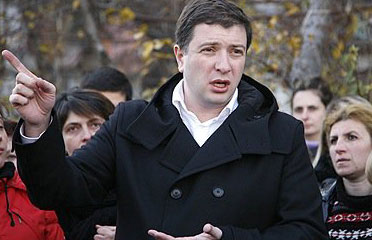
Arrest of Opposition Leader Jeopardizes Georgia’s European Integration
Publication: Eurasia Daily Monitor Volume: 11 Issue: 129
By:

A Tbilisi city court has refused to release Gigi Ugulava, the former mayor of the Georgian capital, out on bail, instead sentencing him to two months in pre-trial detention. Ugulava is fighting a series of charges brought against him by the Prosecution and the investigative department of the Ministry of Finance (Civil Georgia, July 5).
Gigi Ugulava was arrested at the Tbilisi airport when he attempted to leave for Kyiv and then on to Chisinau to participate in a regional conference of the Council of Europe (Civil Georgia, July 3). Ugulava was elected by the residents of Tbilisi in 2010 but was then dismissed from his position by the current authorities. He had intended to return to Georgia on the same day to avoid being accused of attempting to escape from justice. Indeed, at the moment of arrest, he possessed a return ticket to Tbilisi in his pocket. However, finance ministry investigators still handcuffed him and sent him to jail. Later, during Ugulava’s bail hearing, the Prosecution claimed it had received information about his plans to leave the country for good.
Notably, however, a day before that hearing, another set of judges at the same court ruled that the prosecution’s demand to forbid the former Tbilisi mayor from leaving the country was unfounded, and they did not grant the prosecutors permission to confiscate Ugulava’s foreign passport (Civil Georgia, July 2). Therefore, legally Ugulava had every right to leave Georgia under the condition of returning to face trial.
At the time of his arrest, Ugulava, who is considered to be among former president Mikheil Saakashvili’s closest associates, headed the headquarters of the opposition party, the United National Movement (UNM). The prosecution started to suspect Ugulava of embezzlement-related crimes immediately following the victory of billionaire Bidzina Ivanishvili’s Georgian Dream coalition in the 2012 parliamentary elections. Over the past 18 months, the former mayor of Tbilisi was accused of nepotism, misappropriation of assets of the late businessman Badri Patrikatsishvili’s TV company Imedi, corruption related to a Tbilisi street parking contract with an Israeli company, money laundering via offshore accounts to benefit the UNM, and of insulting the district electoral commission chair several days prior to the 2014 municipal elections. Altogether, the charges add up to as many as 30 years in prison (Kommersant, July 6).
However, Ugulava’s supporters call the charges groundless and politically motivated, aimed at trying to eliminate the opposition UNM party. “The government of Irakli Garibashvili is unable to resolve the economic and security problems of the country. They want to compensate for their failures through a campaign of arrests of political opponents in order to force us to shut our mouths,” UNM parliamentary deputy David Darchiashvili told Jamestown. He also did not rule out a possibility that his party might soon be forced to revert to street protests. Another UNM parliamentarian, Giorgi Kandelaki, argued that Georgian Dream’s “political vendetta against UNM” was “strengthening [the] anti-Western trends in the ruling coalition” (Author’s interviews, July 11).
On the other hand, Prime Minister Garibashvili called Ugulava’s arrest and the court’s decision to deny him bail a “celebration of justice.” “Yesterday we saw once again the [actions of an] independent judiciary and an objective, fair decision of an independent judge,” Garibashvili said (Civil Georgia, July 5).
Georgia’s Western partners—on whom the country heavily depends politically, economically and militarily—evidently disagree with this assessment, however. The United States ambassador to Georgia, Richard Norland, did not hide his concern, calling Gigi Ugulava’s arrest “a serious matter for Georgia.” “We remain focused on principles and due process,” the diplomat warned, adding that Washington was especially concerned that the arrest of the opposition leader came amidst “a pre-election environment, prior to the July 12 run-off elections. It is more important than ever that legal proceedings observe the highest standards of due process and be free of any type of political interference” (tabula.ge, July 6).
The European Commission’s statement was also quite harsh. “We are following closely the arrest of Mr. Gigi Ugulava at Tbilisi airport on 3 July. We note that Mr. Ugulava, previously suspended as Mayor of Tbilisi, is the opposition’s chief campaign organiser during the ongoing municipal elections in Georgia. We recall Prime Minister Garibashvili’s announcement on 14 April of a moratorium on the arrest and prosecution of opposition figures during this election period,” reads a statement released by the European Union foreign policy chief Catherine Ashton’s spokesperson on July 4 (Rustavi2, July 5).
Furthermore, Swedish Foreign Minister Carl Bildt, one of the authors of the EU’s Eastern Partnership program of which Georgia is a member, stated that Ugulava’s arrest “seems to run contrary to [Georgia’s] previous commitment to the rule of law” (Interpressnews, July 5).
Western observers have questioned why the Georgian authorities insisted on Ugulava’s pre-trial detention when, in the West, the usual practice is to release public figures on bail until the trial—particularly when the suspect is not charged with violent criminal acts.
But former French president Nicolas Sarkozy’s arrest gave the authorities in Tbilisi the chance to reject accusations of bias and politically motivated actions. “Will France now be excluded from the European Union?” Minister for Euro-Atlantic Integration Aleksi Petriashvili asked ironically on his Facebook page (Vestnik Kavkaza, July 10). EU ambassador to Georgia Philip Dimitrov immediately responded, rejecting all the parallels between the cases of Sarkozy and Ugulava. Ambassador Dimitrov warned that the Association Agreement, which Georgia signed with the EU on June 27, “does not mean that everything else, including visa liberalization, is guaranteed. […] It would be my strong recommendation for the Georgian government to read our statements… If the government gives more attention to the EU’s statements, it will be able to avoid one that could be an unpleasant surprise…” the EU diplomat noted in an interview with the PirWeli news agency (tabula.ge, July 7).
Georgian authorities are thus under strong pressure to take the West’s reaction into account. But the government’s track record, including the cases against Gigi Ugulava and other associates of former president Saakashvili, already produces significant skepticism about Georgia’s future path toward the EU and the North Atlantic Treaty Organization (NATO). These Euro-Atlantic institutions are especially sensitive to the respect for common values, and so Tbilisi will need to demonstrate its ongoing commitment to democratic norms even while it is investigating complex and notorious criminal cases.




